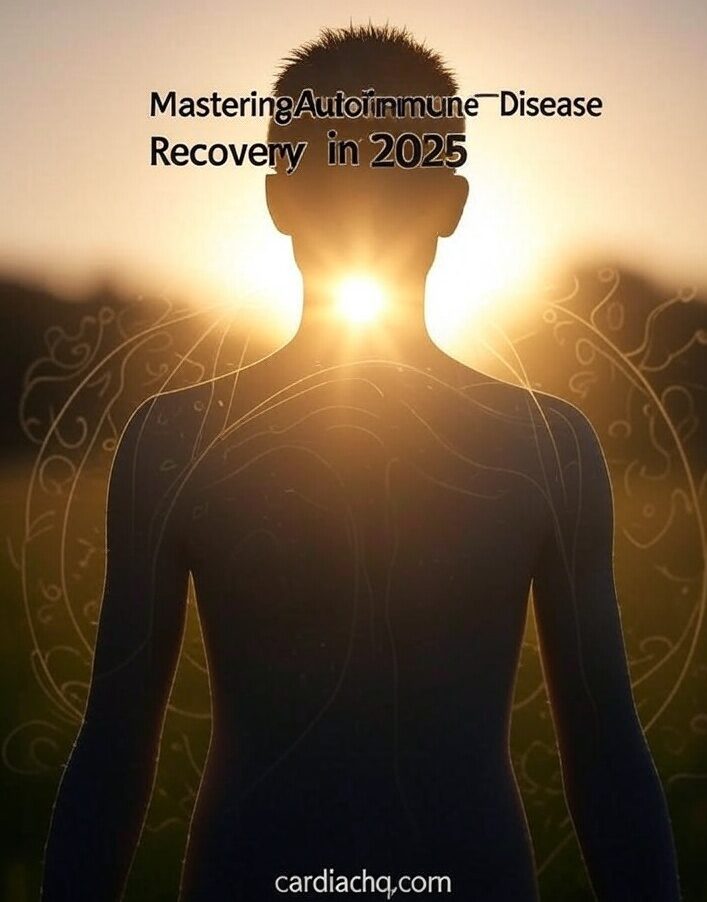Mastering autoimmune disease recovery in 2025 represents a transformative journey for the millions affected by conditions like multiple sclerosis, Hashimoto’s, lupus, and rheumatoid arthritis. As autoimmune diseases continue to challenge global health, recovery has evolved beyond mere symptom management into a holistic process aimed at restoring immune balance and enhancing quality of life.

In 2025, this journey is fueled by groundbreaking medical advancements, personalized lifestyle shifts, and robust community support, all tailored to the year’s innovative landscape. This comprehensive guide delves into the latest strategies to achieve autoimmune disease recovery, from understanding what drives recovery to leveraging cutting-edge treatments and fostering a supportive environment.
Whether you’re seeking remission or simply aiming to improve your daily well-being, this post offers actionable advice backed by 2025’s most relevant developments. Dive into linked articles for deeper insights and begin your recovery path today. For additional resources, explore cardiachq.com, a platform dedicated to supporting chronic condition management.
Section 1: What Does Recovery Mean for Autoimmune Diseases?
Recovery in the context of autoimmune disease recovery varies depending on the condition. For some, like lupus, it may mean achieving remission—where disease activity is minimal or absent—while for others with Crohn’s disease, it might involve significantly reduced flare-ups and improved digestive health. In 2025, recovery is redefined as a state of immune regulation, where the body’s self-attack is minimized, and quality of life is restored.
This shift is supported by AI-driven health insights that analyze patient data to predict and prevent relapses, a trend gaining traction this year. Unlike a cure, which remains elusive for most autoimmune diseases, autoimmune disease recovery focuses on long-term management and resilience. Understanding this distinction empowers patients to set realistic goals. For a deeper dive into recovery triggers, check out our guide “Steps to Achieve Autoimmune Remission in 2025” (#).
Section 2: Key Factors Influencing Autoimmune Recovery
Several factors influence the path to autoimmune disease recovery, starting with genetic predispositions that increase susceptibility. Research in 2025 highlights how specific gene variants, such as those in the HLA complex, contribute to conditions like type 1 diabetes, setting the stage for immune dysregulation.
Environmental triggers, including chronic stress, viral infections, and pollution, further activate these genetic risks, making avoidance a critical strategy. Additionally, the gut microbiome emerges as a pivotal player, with 2025 studies showing that imbalances can exacerbate autoimmune healing challenges. Innovative microbiome therapies, tailored to individual profiles, are a breakthrough this year, offering new hope for recovery.
Lifestyle choices—diet, exercise, and sleep—also play a significant role, with an anti-inflammatory approach proving effective across multiple conditions. To explore these factors further, visit cardiachq.com for personalized health tracking tools, and see “What Causes Autoimmune Diseases? Unraveling the Mystery” (#) for detailed insights.

Section 3: Innovative Recovery Treatments in 2025
The landscape of autoimmune disease recovery in 2025 is revolutionized by innovative treatments that push beyond traditional methods. Personalized medicine, driven by genetic and biomarker analysis, allows doctors to customize therapies, reducing side effects and boosting efficacy for diseases like psoriasis. Gene editing, still in its early phases, holds promise for correcting immune errors at their source, potentially leading to sustained autoimmune remission.
These 2025 recovery strategies are complemented by biologics and immunosuppressants, which remain foundational but are now enhanced with AI to optimize dosing. Clinical trials this year are exploring these therapies’ long-term impacts, offering hope for conditions like multiple sclerosis.
Patients can track treatment progress with wearable devices, a 2025 trend supported by platforms like cardiachq.com. For a detailed breakdown, explore “Exploring Autoimmune Disease Treatment Options in 2025” (#), which expands on these advancements.
Section 4: Lifestyle and Diet for Recovery
Lifestyle and diet are cornerstones of autoimmune disease recovery, with 2025 bringing refined approaches to maximize their impact. An anti-inflammatory diet, rich in omega-3s from salmon and antioxidants from berries, helps reduce inflammation, a key barrier to autoimmune healing.
The autoimmune protocol (AIP) diet, which eliminates triggers like gluten, further supports gut health—a focus of current research. Gentle exercises like yoga or swimming improve mobility without triggering flares, while adequate sleep restores immune function. In 2025, wearable technology monitors these habits, providing data to adjust routines effectively.
Integrating these practices with medical treatments creates a synergistic effect. For meal ideas and exercise plans, check “Best Diet Plans for Autoimmune Disease Management” (#) and “Living Well with Autoimmune Conditions: Daily Tips for 2025” (#). Enhance your journey with tools from cardiachq.com.
Section 5: Building a Support System for Recovery
A strong support system is vital for autoimmune disease recovery, offering emotional and practical assistance. Autoimmune support groups, both online and in-person, provide a space to share experiences and gain encouragement, a growing trend in 2025’s telehealth boom.
Virtual communities connect patients globally, fostering resilience against conditions like Sjögren’s syndrome. Family involvement and mental health professionals also play roles, addressing the psychological toll of chronic illness. In 2025, AI-powered platforms enhance this support by matching patients with relevant groups and resources, accessible via cardiachq.com.
This network bolsters autoimmune healing, making recovery a shared endeavor. For more on daily support, explore “Living Well with Autoimmune Conditions: Daily Tips for 2025” (#).
Conclusion
Mastering autoimmune disease recovery in 2025 is a multifaceted process that combines cutting-edge treatments, lifestyle adjustments, and a robust support system. From understanding recovery triggers to embracing 2025 recovery strategies, this guide equips you with the tools to pursue autoimmune remission or improved health.
The integration of AI, personalized medicine, and community support reflects the year’s progress, offering new hope for those affected. Start by consulting a healthcare provider to craft a tailored plan, incorporating diet and exercise insights from linked guides. Leverage cardiachq.com for tracking and community resources to stay on track.



